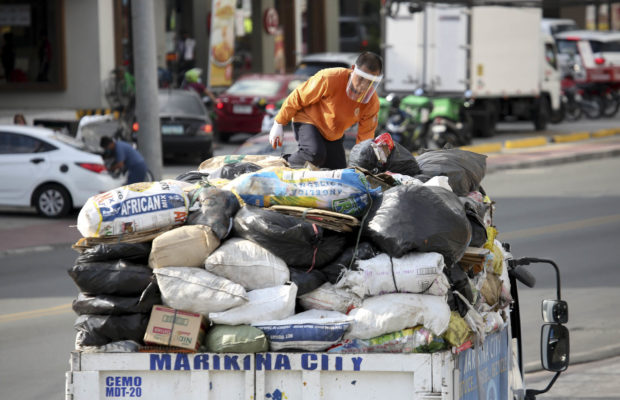
ENHANCED EXPOSURE A garbage collector does a balancing act while stacking up bags of trash on a moving dump truck en route to a waste transfer station in Barangay Santo Niño, Marikina City, in this photo taken on April 11, 2021. With their job made more hazardous by the coronavirus outbreak, trash collectors deserve more than just a pat on the back these days, according to the environment watchdog EcoWaste Coalition. (File photo by LYN RILLON / Philippine Daily Inqurier)
MANILA, Philippines — Local government units should enforce stricter waste disposal rules, especially with hazardous waste coming from facilities used by COVID-19 patients, the Commission on Human Rights (CHR) said in a statement issued on Tuesday to mark the celebration of the Philippine Environment Month.
In line with this, the CHR urged the national government to be stricter in monitoring LGUs in their compliance with the Interim Guidelines on the Management of Covid-19 Related Health Care Waste that was issued by the National Solid Waste Management Commission (NSWMC).
“Due to the pandemic, the collection of waste from certain locations such as quarantine facilities, lockdown areas, and isolation centers pose a different set of hazards to local communities since they may be potentially infected with the coronavirus,” CHR spokesperson Jacqueline de Guia said.
“The environmental degradation we are exposed to in our daily lives can lead to very serious and continuing violations of our human rights,” De Guia said. “People’s health, food and water safety, housing, and overall well-being can be negatively affected by improper disposal of waste and hazardous materials.”
“Some of the health and environmental risks of illegal dumpsites include the contamination of soil and water; increased risks of natural disasters and health issues; and disruption of wildlife. Unlike sanitary landfills, illegal dumpsites do not have built-in systems and constant monitoring for environmental safety,” she explained.
In this context, the CHR praised the Department of Environment and Natural Resources (DENR) for doing its part in curbing dangerous waste disposal practices, such as the use of open dumpsites.
Last January, DENR Secretary Roy Cimatu ordered the closure of some 200 remaining open dumpsites nationwide by March in compliance with the solid waste management law.
Cimatu urged local officials to strictly enforce the Ecological Solid Waste Management Act, which took effect in February 2001.
CHR hopes that the closure of open dumpsites would make people more aware of proper waste disposal.
“With or without the pandemic, the CHR underscores that from national to household levels, there is an urgent call for waste management to be treated as essential public service,” De Guia noted.
“This will not only improve environmental sustainability and health outcomes but will surely contribute to the full enjoyment of our basic human rights,” she added.
RELATED STORIES
DENR orders closure of 200 open dumps by March
DENR orders shutdown of sanitary landfill in Pangasinan